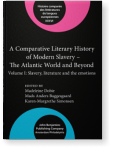Chapter 15
Scenes of emotion in French early-modern travel writing from the Caribbean
Du Tertre, Mongin, Labat
This chapter examines the inclusion of voices of the enslaved in seventeenth-century French travel
writing to the Caribbean by looking at three missionaries writing at different moments of the French settlement and
early colonization: Histoire générale des Antilles habitées par les François (1654 and 1667–1671),
written by the Dominican missionary Jean-Baptiste Du Tertre; Jesuit missionary Jean Mongin’s letters on the
evangelization of slaves, written in the 1680s; and Dominican Jean-Baptiste Labat’s Nouveau voyage aux Isles
de l’Amérique, from his stay in Martinique between 1694 and 1706. It makes the argument that while
commerce and profit were unquestionably the main motivations for allowing and sustaining slavery, travelogues also
play on another, emotional register when representing slavery. The aim of the chapter is to interrogate the factors
underpinning this representational strategy and in so doing to draw conclusions about how the techniques and
motivations for including voices changed as slavery was gradually naturalized in the Caribbean.
Article outline
- Du Tertre: Voicing contradictions
- Mongin: The divine voices of the enslaved
- Labat: Controlling speech and emotions
- Concluding remarks
-
Acknowledgements
-
References
This content is being prepared for publication; it may be subject to changes.
